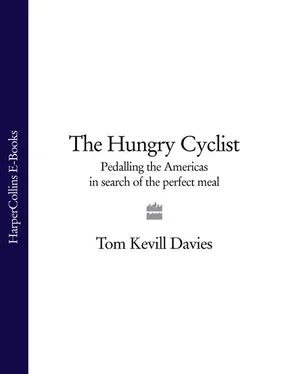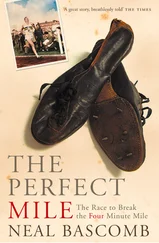‘Flax seems to be coming through well this year.’
‘Need to get my barley in before it gets too cold.’
‘Could be an early frost this year, judging by the clouds.’
Farming in North Dakota is no easy task. Operating on such a grand scale means that changing crop prices, varied weather patterns, a wrong decision or simply some bad luck can make it hard to survive. These modest men had to be mechanics, meteorologists, botanists, gamblers, drivers and chemists, who worked tirelessly to feed America. Watching the harvests of wheat, flax and barley come in as I rode through their factory floor, I could only admire them.
Although the Midwest of America may host some of the most fertile land on the planet, after a week crossing the bread basket of America I began to wish that her farmers would grow some vegetables. Diner after diner in these small prairie towns pushed out endless carb-packed breakfasts, hefty daily specials and meaty evening meals, but the closest I got to any greenery was, in most cases, depicted in the pattern on my plate. Thus I became a skilled user of any all-you-can-eat salad bar I was lucky enough to come across. Not all diners offered such a luxury, and even if they did it was often hard to find anything genuinely nutritious among the mayo-dressed starchy offerings that prevailed. But if there was any vegetation, I would pounce, playing a precarious game of Crudités Jenga and making the most of the little ceramic real estate I was given on my one visit to the bar.
Feeling lighter and faster, I pushed deeper into North Dakota and the now-familiar crops of flax, wheat and barley began to be replaced by ranches dotted with cattle. I was getting to cowboy country.
This is looking good. This is looking really good.
I glanced down at my watch.
Could be a personal best.
A second time-check confirmed my excitement. Thirty-three minutes and seventeen seconds. I had sucked the same sour cherry drop for over half an hour, smashing any previous records, and I celebrated my proud achievement by popping another sweet in my mouth and continued pushing into a fierce headwind. Sapping every ounce of my strength, it howled in my ears and meant I had been crawling forward at no more than five miles an hour all day. My dry lips were peeling in large flakes, my knees complained with every turn of the pedals and the road sign for Stanton could not have come soon enough.
Stanton, North Dakota was another small one-street town that called itself a city. Three or four miles off Highway 200, it sat on the banks of the Knife river. Its dusty main street of flat-fronted rundown buildings was no different from all the other small towns I had passed through. The liquor store, the general store, the gun store and the diner. The place was deserted.
A guttural growl followed by a loud sound of spitting broke the silence of the afternoon. In a beaten-up blue Lincoln a man, apparently with nothing better to do, was busy topping up a puddle of brown tobacco-infused phlegm in the street. I cycled over to where he was parked.
A bald round-faced individual was slouched in the driver’s seat. His dome-shaped belly swelled under a dirty shirt and a pair of braces while Willie Nelson sang about a ‘Whiskey River’ from a radio set hidden among the dusty papers and coffee cups on the dashboard.
‘Good afternoon, sir. You don’t know anywhere a guy can camp in Stanton, do you?’
‘Heeeeeeech papuut! City Park, down by the river. Gonna get mighty busy though.’
‘Yeah, why’s that?’
‘Stanton Rodeo.’
‘Sounds fun.’
‘If you’re into that kinda thing. Heeeeeech papuuut!’
Another projectile flew from deep inside the man and landed perfectly in his puddle of spit. I thanked him for his information, steered wide of his phlegmy pond and rolled down the empty main street towards the river.
I unpacked and pitched camp in the shade of some large cottonwood trees with the muddy banks of the slow-moving Knife river only a few yards away. I slipped out of my sweat-stained T-shirt and my stand-alone padded Lycra, and waded into the river. The cool water washed away a week on the road and, after washing my clothes and hanging them up to dry, I put on clean jeans and a shirt and walked along the riverbank. The sun was setting in the west, painting the white bluffs of the distant Missouri river a soft orange. The silver leaves of the willow and cottonwood trees that lined its banks rolled gently in the wind. The town park provided basic brick grills, and once I had cleaned out the cigarette ends and incinerated beer cans from one, I set about collecting enough dry wood to see me through the night. With a small fire reduced to glowing embers, I unwrapped a large steak I had picked up in the general store and poured a tin of beans into my pan. I opened a can of Budweiser and lay back next to my fire to enjoy a peaceful North Dakotan Friday night.
The following morning I was woken from a deep sleep by the grumble of engines and the whining of generators. Peering from my tent I saw that the park was fast filling up with bulky pick-up trucks, trailers and oversized motor homes. Deckchairs were being spread out in designated camping spots and the park was abuzz with weekending Americans doing something weekending Americans do very well. Camp.
In the United Kingdom we don’t know how to camp. Our idea of a weekend’s camping involves hiking to a cold, wet and desolate corner of the country, cooking an inedible meal from a ration pack, then spending a sleepless night cramped inside a smelly nylon shell designed for a hobbit. Americans, being Americans, do it very differently.
Motor homes the size of central London flats are plugged and plumbed into specialist bays. Reclining deckchairs with beer holders and sun visors are unfolded. Cold boxes the size of industrial freezers are unloaded. Smokers and multi-grill BBQs are constructed while sun shelters and gazebos are erected. The vast array of specialist camping gear available on the market allows Americans to recreate the ambience and comfort of their living room anywhere on the continent. Here in Stanton with my tiny tent and lightweight equipment I felt completely out-gunned, but I was only too happy to enjoy the hospitality of my new neighbours. Music played, beers burst open and another Midwestern weekend got under way. I was hanging out with the rodeo crowd, a faithful group of nomads who spend their summers following, and competing in, the various rodeos that take place across the States.
Rodeos are an important part of American culture. In the early eighteenth century, when the Wild West opened up, its grassy plains provided perfect cattle-grazing country. To feed the soaring population of the cities of the eastern United States, huge herds of cattle needed to be moved from west to east. For the cattle barons to get their commodity across country, long cattle drives were organised, and the skills of roping, branding, herding, horse-breaking and bronco-riding were vital to the cowboys who made these remarkable journeys.
The expansion of the railways and the introduction of barbed wire in the late nineteenth century meant that these roaming cross-country cattle drives were no longer possible or economically viable, creating a dip in demand for the specialist skills cowboys provided. Entrepreneurial ex-cattle hands, such as the famous Buffalo Bill Cody, began to organise Wild West shows that did their best to glorify and preserve the traditions of the fast-disappearing American frontier culture, and many cowboys found work in these shows that toured the country in what became an entertainment phenomenon. Part theatre, part circus, part competition, they recreated famous battles of the American Civil War and victories over Indians, as well as providing opportunities for cowboys to compete against each other for cash. Today Wild West shows still exist and the rodeo circuit is still strong, commanding large crowds, big prize money and a wide television audience. Stanton Rodeo, my first, was a low-key team-roping event. I leaned on the rusty metal fence of the enclosure as it got under way.
Читать дальше












